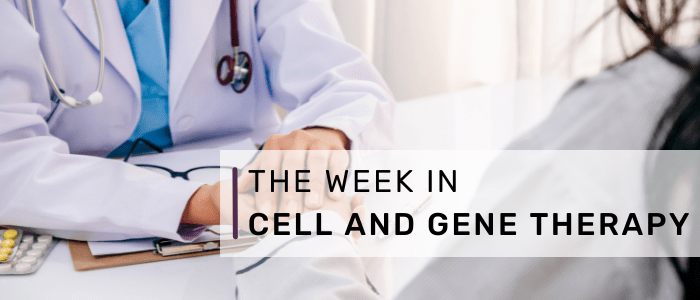Cell therapy weekly: clinical hold removed from all Allogene Therapeutics’ allogeneic CAR-T trials

This week: Allogene Therapeutics’ five clinical trials for AlloCAR T can restart after removal of clinical hold, Century Therapeutics and Bristol Myers Squibb will collaborate on iPSC-derived allogeneic cell therapies and AVROBIO shifts focus from Fabry disease following disappointing Phase II results.
The news highlights:
- Clinical hold removed from all Allogene Therapeutics’ allogeneic CAR-T trials
- Century Therapeutics and Bristol Myers Squibb will collaborate on iPSC-derived allogeneic cell therapies
- AVROBIO shifts focus from Fabry disease following disappointing Phase II results
Clinical hold removed from all Allogene Therapeutics’ allogeneic CAR-T trials
After a 4 month investigation, FDA has found that chromosomal abnormalities detected in a single patient were not related to the manufacturing or gene editing processes for Allogene Therapeutics’ (CA, USA) investigational allogeneic CAR-T therapy, AlloCAR T. A clinical hold was placed on all five clinical trials of AlloCar T in October 2021 but trial investigators found that the abnormality detected in a patient in the ALPHA2 study was unrelated to the TALEN gene editing or Allogene’s manufacturing process and held no clinical significance.
“We are thankful for the partnership between our teams at Allogene, our clinical trial investigators who remain steadfast in their support of our investigational therapies, and the FDA which expeditiously completed its review of our Complete Response Letter,” said Rafael Amado, Executive Vice President of Research and Development and Chief Medical Officer, Allogene Therapeutics. “Allogeneic CAR T therapy is a rapidly developing field that continues to evolve both in scope and impact, and the findings from our investigation will help advance innovation in the fields of gene editing and cell and gene therapy. As the leading developer of allogeneic cell products, we look forward to resuming our clinical trials as we work to fulfill our commitment to bring patients the first allogeneic CAR T product.”
Century Therapeutics and Bristol Myers Squibb will collaborate on iPSC-derived allogeneic cell therapies
A new collaboration aims to develop and commercialize four induced pluripotent stem cell (iPSC)-based therapies for hematologic malignancies and solid tumors. The collaboration, between Century Therapeutics (PA, USA) and Bristol Myers Squib (NY, USA), will develop Century’s natural killer (NK) and T cell programs, and will initially target acute myeloid leukemia and multiple myeloma.
“We are pleased to partner with Bristol Myers Squibb, a global leader in oncology and hematology, to further expand our pipeline of iPSC-derived cell therapy products for challenging hematological and solid tumor malignancies,” said Lalo Flores, Chief Executive Officer, Century Therapeutics. “…Additionally, this collaboration will enable deployment of our next-generation iPSC platform to develop products targeting malignancies that are difficult for biotech companies to tackle on their own.”
“The collaboration with Century Therapeutics is an important part of our investment strategy in next-generation cell therapies for hematologic and solid tumors,” said Rupert Vessey, Executive Vice President & President, Research & Early Development, Bristol Myers Squibb. “Century’s iPSC-based gamma delta T and NK cell platforms show promise and are complementary to Bristol Myers Squibb’s existing cell therapy technologies.”
AVROBIO shifts focus from Fabry disease following disappointing Phase II results
AVROBIO, Inc. (MA, USA) have announced a shift in their portfolio priorities away from Fabry disease following new data from Phase II trials that would ‘significantly extend the program’s development timeline’. Instead, the company will focus efforts on their cystinosis and Gaucher disease type 1 programs.
“Previously reported data from 13 patients treated across our three clinical-stage programs have shown durable engraftment out 9 to 54 months. It is the new data from the five most recently dosed Phase 2 FAB-GT patients that are discordant with these other data and show variable engraftment. In addition, the last 12 months have presented multiple challenging market and regulatory dynamics for our Fabry disease program, which would now be exacerbated by a meaningfully extended development timeline,” said Geoff MacKay, president and CEO of AVROBIO. “We’re fully aware of the impact this difficult decision has on the patients and families whom we have had the privilege to get to know over the years, but we believe deprioritizing and halting enrollment in our Fabry disease program is the right step forward for AVROBIO and preserves our ability to continue developing therapies with the potential to address urgent unmet needs in the lysosomal disorder community.”
You might also like:
- RMAT for posoleucel: good news for AlloVir’s T-cell-based therapy for post-stem cell transplant adenovirus infection
- Cell therapy weekly: CCRM Enterprises launched to invest in regenerative medicine technology
- Cell therapy weekly: scientists discover new organoid that mimics how gut and heart tissues arise cooperatively from stem cells